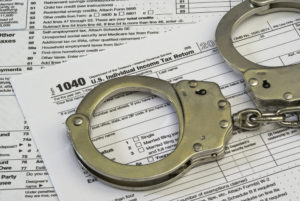In the recent case of United States v. Stockler, the taxpayer-defendant pleaded guilty to willfully failing to file a federal income tax return. While the appellate decision primarily focuses on the appropriate loss figure for purposes of the U.S. Sentencing Guidelines, the case provides yet another reminder that it is a federal crime to willfully fail to file a tax return–and one that can land a non-filer in prison.
The Elements of a Failure to File
The crime of willfully failing to file a return has three elements: the taxpayer 1) was required to file a return; 2) failed to file at the time required by law; and 3) the failure to file was willful. The relevant statute, 26 U.S.C. Section 7203, provides as follows:
Any person required under this title to pay any estimated tax or tax, or required by this title or by regulations made under authority thereof to make a return, keep any records, or supply any information, who willfully fails to pay such estimated tax or tax, make such return, keep such records, or supply such information, at the time or times required by law or regulations, shall, in addition to other penalties provided by law, be guilty of a misdemeanor and, upon conviction thereof, shall be fined not more than $25,000 ($100,000 in the case of a corporation), or imprisoned not more than 1 year, or both, together with the costs of prosecution. In the case of any person with respect to whom there is a failure to pay any estimated tax, this section shall not apply to such person with respect to such failure if there is no addition to tax under section 6654 or 6655 with respect to such failure. In the case of a willful violation of any provision of section 6050I, the first sentence of this section shall be applied by substituting “felony” for “misdemeanor” and “5 years” for “1 year.”
As a result, section 7203 actually criminalizes four separate events: a willful failure to file a return, keep records, supply records/information, or pay a tax owed. With the exception of cases involving willful violations of any provision of section 6050I, all of the offenses under section 7203 are misdemeanors. The charge most often brought under section 7203 is the failure to file a return, but the government also brings a number of cases under section 7203 for failure to pay. That said, the attempt to evade or defeat the payment of a tax is a felony under section 7201 of the Code—and that provision provides for harsher penalties when it applies.
The Statute of Limitations
The statute of limitations for a section 7203 violation is six years for a failure to file or pay tax; it is, however, only three years for a failure to supply information or keep records. The statute generally runs from the due date of the return or payment, although where there is evidence of willfulness at a later date, the limitations period may begin from the date of the last act of willfulness.
Moving Forward
Those with unfiled tax returns should seek legal advice from a competent attorney regarding the potential legal ramifications of any unfiled a tax returns. In addition to potential criminal exposure, a fraudulent failure to file may also trigger civil exposure – e.g., fraudulent failure to file penalties under Section 6651(f) – and both can apply. In seeking out assistance on such sensitive issues, one should also bear in mind that conversations with non-attorney accountants are not privileged or entitled to protection with respect to criminal matters. See discussion in Representing Taxpayers in Sensitive Audits: A Look at the Fundamental Challenges of an Eggshell Audit. Thus, any dialogue with non-attorneys should be approached with care. There are often options available to taxpayers to remedy past reporting deficiencies and minimize – or even remove – any criminal exposure.
White Collar Defense Attorneys
Freeman Law represents companies, executives, and individuals in regulatory and white-collar government investigations and prosecutions. We employ a proactive approach to defend vigorously and strategically position our clients. White-collar matters often involve parallel regulatory and civil proceedings. Freeman Law can navigate the complexities and collateral consequences of multiple proceedings. And when it comes to the court of public opinion, we employ ethical and strategic tactics to manage publicity. Schedule a consultation or call (214) 984-3410 to discuss your allegations and investigations concerns.

